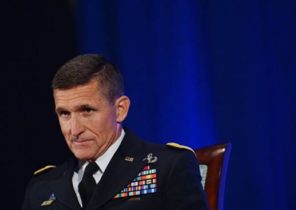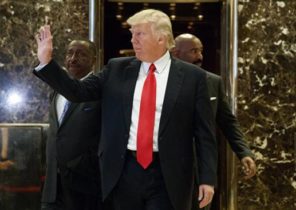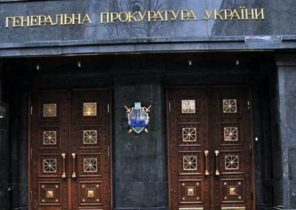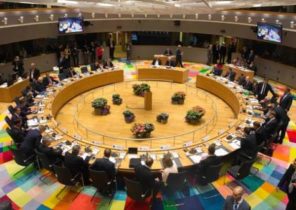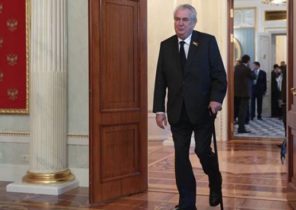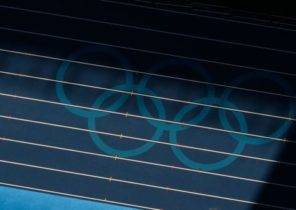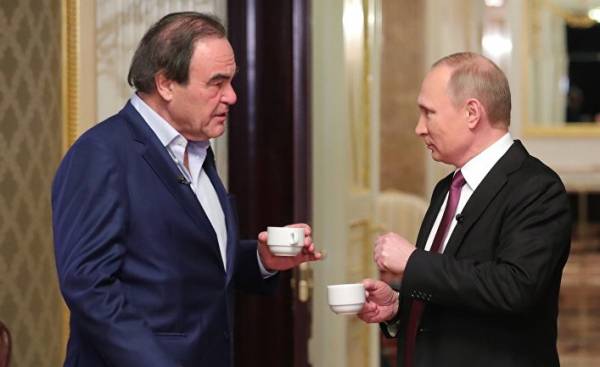
“Have you ever been beaten?”, — asks Vladimir Putin a question Oliver stone closer to the end of a remarkable four-hour documentary about the Russian leader. “Yes,” responds stone. “Then you have nothing new is not, because you will suffer for it,” — said the Russian leader before you leave the room, causing memories of the Sistine chapel in the mixture with the most fervent imaginations of interior designer Donald trump.
In this case, Putin was right. Edition of the Daily Beast called the epic film in four parts under the title “Putin” (“Interview with Putin”) “terribly irresponsible love letter” to the Russian President. “About Oliver stone, this film says just as much about Vladimir Putin,” — said the TV channel CNN. “Flattery with a little skepticism,” said New York Times.
Pretty harsh words in the address of the project given the fact that it took a whole life full of achievements to get it and two years to implement. Stone against such statements? “You know, this is reflected in the movies. You work on a film very hard, and sometimes it is judged more on the identity of the Creator than the content. In this sense, I can say black. It is not in the content, not the content of my character, and the nature of my investigation.”
Stone man is multifaceted. Sitting in a posh hotel “Conrad” in Manhattan in the room where on the wall hangs a painting of Elizabeth Peyton, he looks like a real film Director-the Oscar winner, who directed classics like “Platoon”, “Born on the fourth of July,” “natural Born killers”, and at the same time, the film is a dud “Alexander” (Alexander the great played by Colin Farrell). He wrote the script for “Scarface” and in the movie “wall Street” gave her a short and succinct description: “Greed, for lack of a better word, is good. Greed is right, greed works.” He is a veteran of the Vietnam war, having awards. And he is not black. Although it is because of such statements a man of his age (almost always men) today are in trouble. At the risk of losing the remainder of the interview, which has just begun, I pass these words on deaf ears, wanting to hear him out.
This decision, but on a much larger scale, had brought trouble to the project stone. In the first half of his documentary film, Putin admits that he has no bad days, because he is “not a woman”. “I don’t want to offend anyone, he says, doing just that. — It’s just in the nature of things. There are certain natural cycles”. He also admits that would not have gone to shower with a gay man. “Why provoke him? But you know that I am a master of sports in judo”. And these are the words of the head of a country that’s disgusting refers to the rights of the LGBT community.
Stone ignores these comments on deaf ears. Why he does not argue with Putin? “It’s not my business,” says the Director. He wanted to create a complete portrait of perhaps the most fascinating and frightening leader of this generation. Thinking this stone wants you to know. He’s trying to change the thinking of Putin and show him.
More important, the stone argument is that Putin is not very different from many world leaders, even when it comes to social issues. “Obama was against gay marriage until 2014 or 2015?” asks stone. (In fact, until 2012, but his arguments are convincing and fair, but the Clintons better not even start.) “So what’s the problem? Everyone wants to the front, but have to say the politically correct word, though in America comes not so, and on every damn show. Comedian bill Marr says stupid things (this TV host recently caused a furore by saying in the broadcast of the dirty word “nigger”), but all there is a keen desire to participate in the Orgy of condemnation for sin. That’s all. They like to do. With trump,” says stone.
And what stone thinks about Donald trump? “Do not catch me in this, says the Director. — It will be in the headlines. Instead of talking about my movie will talk about these headlines.”
“Trump’s press interestingly, this is how the game is fun, but it does not meet the needs of civilization, for which the most important is peace, security, peace, safety, peace, security. And we don’t do that”.
Most of the comments on stone’s film about Putin was written when critics watched the first two hours. There is shown a written with sympathetic portrait of Putin, and describes his appearance from the Yeltsin era, reminiscent of the Wild West, which stone describes as “crazy capitalism and alcoholism, a sort of Orgy on Dostoevsky”. However “Interview with Putin” becomes more critical in its content in the following episodes. In the second half of the film stone presses Putin, asking him questions about the hacker attacks on U.S. elections, about the oligarchs and how long he intends to stay in power. Similar to the Sphinx the mask of Putin from time to time gives a crack, but he still remains unmoved judoist with a black belt.
In a sense, the election trump turned to stone as it is impossible by the way. Hacking hacking computers of the National Committee of the Democratic party, allegedly carried out by Russian agents, and the apparent sympathy of trump in relation to Putin before the elections make stone’s film is very relevant and timely. All this would take America by President Clinton.
Everyone wants to know what Putin thinks about trump and about alleged Russian hacker attacks on American elections. Unfortunately, Putin says little about it. Allegations of hacking the hacks he calls “stupid.” “Of course, we liked the idea of electing trump, and he told us to love, as he publicly declared his willingness to restore Russia-American relations”. So Putin said. And he added that it would be nice to establish economic cooperation and the joint fight against terrorism.
But stone continues to insist on. “So why you decided to conduct a hacker attack during the elections?” Putin looks down at his own nails, and then says: “Russia is not engaged”. Stone continues and asks him about the Russian ability to conduct cyber attacks. Putin did not disclose. But, says stone, while it is “very similar to a Fox, just came out of the coop”.
In the film, there are moments like “Aha, gotcha”, but the purpose of the Director, says stone, is to start debates, not end them. For many in the United States, Putin, in the words of McCain, “the butcher”, “bandit” and more terrible threat than ISIS (banned organization in Russia — approx. TRANS.). And according to stone, the public needs to worry about the digital capabilities of the United States. The world is a dangerous place, and both sides had good intentions. Just to demonize Putin, and together with it Russia is dangerous and wrong, says stone. “They have freedom of religion, they do what they want. They are traveling, and the Russians have never lived better than now. But, of course, in America believe that they are unhappy, live in conditions of dictatorship, Stalin’s camps, the Gulag, all of them torturing this monster. It’s just crazy. And the British are even worse, says the Director. I want to say that Murdoch is a lie, he lied about the whole world, and this lie led to the wars.”
Such a view does not receive much support in the corridors of power in Washington or London. And it will challenge many Russians, including the Russian opposition leader Alexei Navalny, who was imprisoned and was subjected to physical attacks for what led the protests against the Putin regime.
As if emphasizing how little in this documentary that will satisfy many critics of Putin, it will be shown in Russia without censorship cuts. It is clear that much of it will give pleasure to the Russian establishment.
But although the advantages of the film stone is debatable, there is no doubt that he and his long-time colleague and producer Fernando Sulichin (Fernando Sulichin), won a brilliant victory. They first met with Putin, when he was working on a film about NSA employee and whistleblower Edward Snowden. Solihin, exuding a severe charm, gets what he needs. During the filming of the spike Lee film “Malcolm X” he persuaded the Saudis to allow shooting in Mecca. This was the first occasion when Riyadh had agreed to shoot a feature picture in the Holy city.
Putin also managed to persuade, and they are two years shooting this film, taking the Russian leader more than a dozen interviews, mostly in February of this year, immediately after the presidential election in the United States. Kremlinologists engrossed in deciphering what we can learn (and can do) about the role of Russia and Putin on Ukraine, cyber-attacks on Syria. All this became a topic of continuing debate, which has led experts to pore over every frame in search of signs and hints of this very slippery statesman. But the average viewer just enchanting the opportunity to see Putin so close, for many hours.
In this film, there are brighter moments, and not all premeditated. Putin and the stone is a very odd couple. Sloppy, awkward, like a bear’s a savage from Hollywood and smarmy, enigmatic politician. That’s not David frost vs Richard Nixon (frost interviewed Nixon interviews after his resignation from the post of President — approx. lane), and on the Ball with Sher Khan, who moved from “the jungle Book” in the Kremlin.
Sometimes it’s like a game like “I — I’m you.” When they go down the corridor in Putin’s Cabinet (before he was a Stalinist), and the TV accidentally shows Putin’s speech in Munich in 2007 in which he refused to diplomatic politesse and accused the US of provoking a nuclear arms race, “almost unrestrained, hypertrophied use of force in international Affairs”.
“You could become a movie star,” says stone, looking at the screen and playing the trump card of flattery. They are in the office to Putin, and he says the compliment: on his Desk is a book of stone’s “Untold history of the United States” (The Untold History of The United States). Putin supposedly reads a lot, but this book looks like haven’t touched it.
There is another revealing scene. Stone prepares to shoot episode in which Putin needs to enter the room, and this pair will behave as though they did not speak for several months. “Go!” shouts stone. Nothing happens. “Begin,” he repeats. Again nothing. He asks to shout a translator. Still nothing. Here the camera moves on the logged Putin, who winks at her, carrying two cups of coffee. If you had any doubts about who’s on set home, but now you’re in complete bewilderment.
But Solihin sees this scene differently. He says that Putin is shy in the presence of the camera. In his opinion, Putin is a funny, good-natured, very human. For others, even in the face of Putin playful people shudder. Sometimes it is very difficult to separate the message from the messenger. Stone understands. Now he seems a bit tired and bored. “All I did was studied in a certain light. The artist is very much limited. I hate it. I’m trying to avoid it, and as you can see, I have made some very diverse films. I would like to do more, but always there are any obstacles. I was independent, I haven’t shot a single film that didn’t want to take. I am responsible for all of his paintings, including those that were not in the best way. But even at my age I do what I think is right. If in your heart there is no feeling of freedom, you’re never with me did not accept,” says the Director.
What’s next? Stone glad Jeremy Corbyn showed such good results in the elections in Britain. “First of all, I like the foreign policy of Corbin. I know he was elected for some other reasons, like for free game of bingo or something. In England they are crazy. But when we think about foreign policy, he understands her better than any other Western politician, and understands what it takes to save the world, what the world needs change.” Maybe his next project will be a documentary about the labour leader? “He’s part of that change. And he can articulate. But the problem is to keep British conservatives, do not let them get up because they are so angry that these right-wing in England. They always want to start some war. You know this reminds of Winston Churchill, who said: “We need someone to kill you””.
But there are first signs that the stone is going to retire. In a recent Facebook message he called “Interview with Putin” “a four-hour daring the culmination of my weird life of an American filmmaker”. What is it? The climax of his career?
“I don’t know, will you give me another chance to make a movie. I never make any assumptions, I try not to do it. Because I did it somewhere in the middle of his career, and I think it spoils people. At least I’m free and can do what I want. I have no commitments that will be me to chafe. You know what I mean? Say tomorrow I can move to Albania”. Why would he? “I don’t know if I want to live the rest of their life under such strict Anglo-Saxon code, I’m getting old, right? Maybe there’s a better, more peaceful way of life, when it is not necessary worrisome to think about what your taxes go to bombing other countries or in the creation of shoddy military equipment”.
